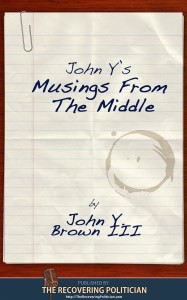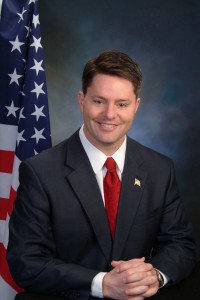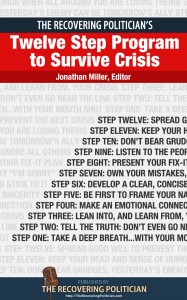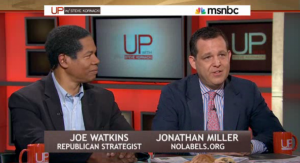RP John Y. Brown, III appeared on “Louisville AM Radio,” with local media titan Rick Redding, to discuss his new book “Musings from the Middle.”
|
The conventional wisdom in the political class is that Tea Party-inspired primary challenges of recent years have had decidedly mixed success. Sure, Ted Cruz, Rand Paul, and Mike Lee have beaten sitting senators and establishment-anointed candidates, changing the issue terrain and nature of debate in the Senate. But most Tea Party candidates imploded. That view largely misses the point. Interest groups seeking more influence within their party should think more like class-action trial lawyers: While it would be great to beat the company, the real reason to fight is not to win a 43-cent check for every plaintiff but to change corporate behavior in a lasting way. Seen this way, even widely mocked far-right challengers have had lasting impact. Although Senate nominees Christine O’Donnell (Delaware), Sharron Angle (Nevada), and Richard Mourdock (Indiana) lost, their primary wins over establishment candidates terrified some other senators, causing them to move right. Witness the pandering of Senate Republican leaders Mitch McConnell and John Cornyn since 2010 to their home-state counterparts Paul and Cruz. Even very marginal primary losers like Arizona’s J.D. Hayworth had an impact, temporarily moving John McCain to the right on key issues like immigration. (McCain, who appears unlikely to seek reelection in 2016, has since shifted back.)
Economic progressives are now clamoring for a Federal Reserve chair more progressive than Larry Summers. But they should’ve thought of that last year and, for instance, challenged incumbent Delaware Senator Tom Carper, who consistently votes with Republicans on banking and finance issues. They could have attempted to nationalize the race as conservative interests groups such as the Club for Growth did for Lee, Mourdock, Cruz, and others. They could have tried to capitalize on the residual energy of the Occupy movement to energize liberals angry at the Clinton-ushered takeover of the Democratic Party by Wall Street which has proven relatively durable even in the wake of the finance-induced Great Collapse. There are many reasons Carper should have been a progressive target — from the obvious policy ones (Carper is the Senate Democrat who votes furthest to the right of his constituency) to logistical (a tiny state where grassroots activism can trump money) and media (close to the Beltway and so easily covered) advantages. And again, winning isn’t necessary: Primary challenges to incumbents can help change policy before the fact — despite ultimately losing, Netroots darling Bill Halter’s Arkansas primary in 2010 made Senator Blanche Lincoln stronger on Dodd-Frank. And if progressives had found a credible candidate, it likely would not have been a fool’s errand — Elizabeth Warren demonstrated the national grassroots thirst for a populist Democrat last cycle, and locally, a political nobody fresh out of law school named Bryan Townsend ran a longshot primary in Delaware last year and upset the entrenched state Senate president, suggesting at least some Delaware Democrats are willing to buck party orthodoxy. Read the rest of… To the extent there is a species of Republican the very left leaning blogosphere approves of, it usually sounds something like this: pro immigration reform and eager to take to task the xenophobic strands of the anti immigration argument; libertarian on gay marriage; skeptical of the Tea Party influence on the modern right; dismissive of government shutdown threats; and independent enough to call out a conservative favorite like Rand Paul when he puts a secessionist sympathizer on the federal payroll. That happens to also be a point by point account of the opinions of the Washington Post’s Republican blogger Jennifer Rubin, and it explains why she has taken her share of shots from the right (Erick Erickson has famously said that she has “nothing in common with conservatives other than hating terrorists”). But the fact that she is something of a punching bag within the left’s online community is a mystery to me and I suspect a lot of others who actually read her work. And the broadside she just absorbed from the Post’s former ombudsman is even more bizarre, when its principal claim is that she is a serial recycler of “every silly right wing theory to come down the pike.” An odd charge, given her relatively centrist views, and the frequency with which she expresses them: albeit a common one based on any random perusal of the comments on her blog. Putting the ex ombudsman aside (there is no politics like intra office politics) the “Rubin is far right” charge seems to typify one of two scenarios: either a classic case of the messenger overwhelming the message or, alternatively, a pretty fair reading of the abuse any card carrying conservative faces in the volleying that passes for ideological debate circa the Obama era. Given that most of Rubin’s online critics probably could not pick her out of a lineup (her only steady television presence is the lightly watched MSNBC roundtable Chuck Todd hosts) and allowing that the author of a three year old column is hardly a long-running bête noire of the left, I’ll opt for theory 2: whatever the precise shade of her ideology, Rubin still wears the c-label as opposed to branding herself a moderate, occupies the most prominent online conservative niche in a liberal leaning paper, and those red flags alone have made her a target. So much so that no matter how many times she deviates from right wing orthodoxy, the credit has been sparse from people who make a habit of dismissing that orthodoxy and claim to value “adults” who break ranks with it. And that’s the most salient aspect of why a blog dustup over a nationally unknown pundit is worthy of examination: it’s a smallish but telling piece of evidence of how liberalism circa 2013 practices its own form of insularity and narrowness, and how the left exists within the same kind of ideological bubble the right is alleged to live inside. The result is a sense of mission about liberal causes that makes it hard to see conservatism in any form as a serious intellectual rival or a sensibility worth understanding. How can it be, when the left assumes that to be a conservative is to be a one percent coddling, gay hating, war on women waging, vote suppressing, science denying kind of clown. Never mind that the supposedly monolithic right is almost Baptist like in its proliferation of rival doctrinal camps. Never mind that George W. Bush tightened more financial regulations than Bill Clinton; that even an eloquent gay advocate like Frank Bruni initially questioned the wisdom of a federal judicial overturn of traditional marriage laws; that the GOP social issue de jour, banning of abortions after 20 weeks, is the position a growing plurality of Americans hold. Never mind that a liberal icon named John Paul Stevens blessed voter ID laws during his Supreme Court tenure, or that the fact of human influenced climate change can be accepted without co-signing the Obama Administration’s aggressiveness on regulating carbon emissions. Notwithstanding any of those stubborn facts, the left’s vision of right and wrong (and smart and dumb) thoroughly monopolizes the mainstream press, and the lion’s share of social media. Its dominance, of course, has generated a parallel universe on the Fox News Channel, with its own convictions and suspicions about the other side. But the presence of a Fox does not change the reality that in the most credentialed and prestigious media circles, denigrating conservatism is the last socially acceptable prejudice; and the rightwing counter to that contempt is still confined to one TV channel and a shrinking pool of radio stations. Read the rest of… From The Daily Journal:
The counter-attack on NBC’s Hillary Clinton miniseries will end up, like most of the pseudo fights in the culture wars, paying dividends for every faction in the dispute. Republicans will stoke their base with this newest evidence that powerful media elites harbor a liberal bias; NBC will end up reaping as many as 40-50 million viewers for two nights of television, the kind of ratings bonanza that is supposedly a thing of the past for non football events; and Hillary’s status as a political heavyweight is enhanced. Everybody not aligned with Joe Biden’s or Cory Booker’s presidential ambitions ends up winning. But rather than dwell on the lines that a network crosses in promoting a potential candidate’s image when its news division will regularly be making coverage judgments about that candidate, and vetting tips and storylines that could weaken the bet its entertainment division is placing, Republicans would do better to remember why those lines are being crossed. Putting partisan blinders aside, it has infinitely more to do with the television industry’s single mindedness about money than any cheerleading agenda. And the nature of the popularity that makes NBC confident that a Clinton miniseries will pay off ought to stress Republicans considerably more than what questions an NBC moderator would pose during a Republican debate. This is the Hillary threat in its broadest context: she is for a generation of professional women, the most conspicuous example of an exquisitely successful balance between motherhood, marriage, and career; for consumers of the last twenty years worth of political/celebrity culture, the Clintons are on a very short list of figures in this era whose reputation has survived so long and actually prospered (maybe Oprah, Buffett and Gates) ; and the resilience inside that survival is the kind of narrative that props up the self help-fixated space in our psychology that knows no class, gender, racial or ideological boundaries. Note that not one line of that portfolio has anything to do with her emerging childcare platform, her just rolled out proposal to undo voting restrictions, or her stewardship of the massive infrastructure that is the State Department, or any of the other standard policy components of a candidacy that her putative 2016 rivals are laboring to assemble right now.
Every one of those intuitions about Clinton’s vulnerability seems sound enough until they roll up against one undeniable fact: five years ago, her brand wasn’t strong enough that a network (and let us not forget a big screen movie in development) would have even considered betting its capital on her. The Hillary of 2008 was too wrapped in the psychodrama of her husband’s adventures, too polarizing, too retrograde to justify that kind of high stakes wager. For whatever combination of reasons, from one more bout of redemption by serving the president who defeated her, to the possibility that after the last four years, experience and bipartisan appeal seem valuable again, the Hillary of the present is decidedly more formidable: ultimately, she has reversed the disintegration over time concept that erodes most brands, a sizable achievement given our chronically weak attention span. Read the rest of…
Meanwhile, enjoy the three clips: Visit NBCNews.com for breaking news, world news, and news about the economy Visit NBCNews.com for breaking news, world news, and news about the economy Visit NBCNews.com for breaking news, world news, and news about the economy
MSNBC’s “All In with Chris Hayes” talks with Piper Kerman, the real-life inspiration behind the series, “Orange is the New Black”, and Jeff Smith, a former Missouri state (Click here to read Jeff Smith’s body of work about his time behind bars.) Visit NBCNews.com for breaking news, world news, and news about the economy Nick Simon, the well-respected CEO of Publisher’s Printing in Sheperdsville, Kentucky, has submitted the following response to Jonathan Miller’s column this week in The Daily Beast: “McConnell’s Fancy Farm Monster Comes Back to Haunt Him.” Enjoy: If the McConnell-Grimes U.S. Senate race in Kentucky in 2014 turns out to be as close as you think, McConnell has an “ace in the hole.” This is the State Constitutional provision denying felons the right to vote. The right can only be restored by a formal pardon from the Governor. This provision was established in the Kentucky State Constitution of 1892 and modified by Section 145 ratified in 1955. Section 145 was proposed by the General Assembly in 1954 and ratified by the voters in 1955. To the best of my research, both the 1892 Constitution and Section 145 were enacted with Democrats controlling both the Governor’s mansion and both Houses of the General Assembly. The Commonwealth of Kentucky does not keep official records on the number of felons in the state. But from two websites, the Sentencing Project and Federal Probation, I got estimates that range from 125,000 to 240,000. Surveys of felons who have the right to vote in other states show they break for the Democratic candidate by 2.5 – 3 to 1 over the Republican candidate. Kentucky is one of three states (the others are Florida and Virginia) that disbar felons from voting for life. So let’s say Kentucky had more “normal” state rules – felons could vote after their sentences are completed, including completion of all parole and probation. Let’s be conservative with the number of felons in the state and take the low figure of 125,000. Let’s say they only break 2 to 1 Democratic, Kentucky being more conservative than the nation as a whole, so their felons might be a bit more conservative also. Of these felons, let’s say only 25% register and vote – 25% of 125,000 is 31,250 votes. They break two-thirds Democratic and one-third Republican 20,834 Democratic votes – 10,416 Republican votes equal a 10,418 net vote margin to the Democratic candidate. So this 10,418 vote deficit is McConnell’s ace in the hole. Because of the restriction of the franchise to felons in the state, Allison Lundergan Grimes will start election night with a tally of negative 10,418 votes, versus what she would start out with in one of the 47 other states in the Union (excluding Virginia and Florida). I did not research the number of felons in the state in 1984, but arguably McConnell’s victory margin of 5,269 votes over Dee Huddleston in 1984 was because of this restriction of the franchise. So on election night in 2014, if McConnell ekes out a victory of 10,418 votes or less, he needs to send a bottle of bourbon over to State Democratic Headquarters in Frankfort. For it was voting rules restricting the franchise of felons established by Democrats who will have made his victory possible – McConnell’s 10,418 vote “Ace in the Hole”. Having written favorably about Chris Christie in the past, and having taken to task Rand Paul on other occasions, it won’t be surprising that I lean toward the governor and not the senator in the much discussed back and forth between the two over national security and electronic surveillance. I am also in the camp that views an internal dust-up between presidential level Republicans as a good thing that promises that the party is headed toward a 2016 field that is decidedly less one-note than the one in 2012. In fact, it’s worth hoping that the conversation between the two current Republican front-runners (as subject to change as Cory Booker’s claim that he won’t run for president in 2016) rapidly expands to encompass the domestic side of the equation. To date, it hasn’t, and the vague, far from congruent, alignments of center-right conservatives and libertarians around various economic and social issues has made this week’s tensions seem artificially stark. In fairness, the non-congruent, hazy nature of these domestic divisions has prevented any coalescing into the kind of binary lines that might lead to more clarity. So, rather than a coherent libertarian v. center-right debate, the 60 percent of Republicans who endorse some revamp of the party have splintered into social moderates who prioritize expanding the party’s appeal to suburban professional women and 18 to 29 year olds; right leaning populists who want to recast the party as a skeptic of crony capitalism and oversized banks, and who reject amnesty for illegal immigrants as a threat to downscale workers; establishment types who want to revive the Bush vision of “compassionate conservatism” and pro-immigration reform; social conservatives who also see merits in amnesty and more emphasis on poverty and education; to libertarians who want to reconcile a move to the center on gay marriage (although generally not abortion) with a hard right turn on entitlements and domestic spending. And the soft borders between these camps mean that in some respects, a Paul has as much of a claim to a reformer mantle as a Jeb Bush.
But there are reasons to think, and to wish, that Christie offers a potential of shaping at least some of the disparate elements of reform into the kind of conservative vision I have praised: one that takes middle class economic anxiety seriously, that is not allergic to market based strategies to address the chronically poor and the uninsured, and that treats a more cohesive, less fractured society as a valid goal of the political right. Some of that promise is rooted in a gubernatorial record that has been impressively attentive to education reform, and that whether he ends up being wrong or right on Medicaid expansion, at least acknowledges the moral dilemma of a low wage poor population that lack health care through no fault of their own. And some of the case for Christie as the best prospective champion of reform is admittedly derived from atmospherics, like his penchant for rebuking some of the less becoming traits on the right, i.e., a NRA web attack ad that featured Barack Obama’s daughters. Read the rest of… The RP had the number one clicked piece in Sunday’s The Daily Beast: “McConnell’s Fancy Farm Monster Comes Back to Haunt Him.” Here’s an excerpt:
Click here to read the entire piece. |
| ||
| Copyright © 2026 The Recovering Politician - All Rights Reserved | |||














